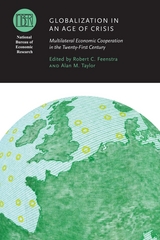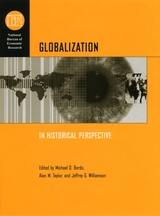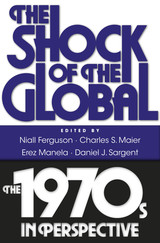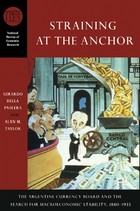
Prompted by these questions, Robert C. Feenstra and Alan M. Taylor have brought together top researchers with policy makers and practitioners whose contributions consider the ways in which the global economic order might address the challenges of globalization that have arisen over the last two decades and that have been intensified by the recent crisis. Chapters in this volume consider the critical linkages between issues, including exchange rates, global imbalances, and financial regulation, and plumb the political and economic outcomes of past policies for what they might tell us about the future of the global economic cooperation.

This volume collects eleven papers doing exactly that and more. The first group of essays explores how the process of globalization can be measured in terms of the long-term integration of different markets-from the markets for goods and commodities to those for labor and capital, and from the sixteenth century to the present. The second set of contributions places this knowledge in a wider context, examining some of the trends and questions that have emerged as markets converge and diverge: the roles of technology and geography are both considered, along with the controversial issues of globalization's effects on inequality and social justice and the roles of political institutions in responding to them. The final group of essays addresses the international financial systems that play such a large part in guiding the process of globalization, considering the influence of exchange rate regimes, financial development, financial crises, and the architecture of the international financial system itself.
This volume reveals a much larger picture of the process of globalization, one that stretches from the establishment of a global economic system during the nineteenth century through the disruptions of two world wars and the Great Depression into the present day. The keen analysis, insight, and wisdom in this volume will have something to offer a wide range of readers interested in this important issue.

Where Latin American government leaders once looked at free trade agreements as solely about trade and trading policies, they are increasingly viewing them as the next beacon of hope in the long and arduous road of economic reform.
Integrating the Americas: FTAA and Beyond discusses how these governments have become embroiled in a larger set of issues affecting both institutions. This work, based on a conference sponsored by the Inter-American Development Bank and the David Rockefeller Center for Latin American Studies, examines how this free trade process is surging ahead, while at the same time taking on a broader set of issues including institutional reform, transparency, the environment, labor, and social cohesion. The payoffs to the strategy of liberalization, privatization, and openness have been meager and disappointing to date. Will the FTAA be able to reverse this and allow Latin America to reap the benefits of globalization?

The fifteen essays in this volume apply the methods of the new economic history to the history of the Latin American economies since 1800. The authors combine the historian's sensitivity to context and contingency with modern or "neoclassical" economic theory and quantitative methods.
The essays shed new light on the economic history of all the major economies from Mexico and Cuba to Brazil and Argentina. Some focus on comparing macroeconomic policies and performance, others analyze key sectors such as foreign trade, finance, transportation, and industry, and still others focus on the impact of property rights, government regulation, and political upheaval.

From the vantage point of the United States or Western Europe, the 1970s was a time of troubles: economic “stagflation,” political scandal, and global turmoil. Yet from an international perspective it was a seminal decade, one that brought the reintegration of the world after the great divisions of the mid-twentieth century. It was the 1970s that introduced the world to the phenomenon of “globalization,” as networks of interdependence bound peoples and societies in new and original ways.
The 1970s saw the breakdown of the postwar economic order and the advent of floating currencies and free capital movements. Non-state actors rose to prominence while the authority of the superpowers diminished. Transnational issues such as environmental protection, population control, and human rights attracted unprecedented attention. The decade transformed international politics, ending the era of bipolarity and launching two great revolutions that would have repercussions in the twenty-first century: the Iranian theocratic revolution and the Chinese market revolution.
The Shock of the Global examines the large-scale structural upheaval of the 1970s by transcending the standard frameworks of national borders and superpower relations. It reveals for the first time an international system in the throes of enduring transformations.

With many countries now using—or seriously contemplating—monetary arrangements similar to Argentina's, this important and persuasive study maps out one of history's most interesting monetary experiments to show what works and what doesn't.
READERS
Browse our collection.
PUBLISHERS
See BiblioVault's publisher services.
STUDENT SERVICES
Files for college accessibility offices.
UChicago Accessibility Resources
home | accessibility | search | about | contact us
BiblioVault ® 2001 - 2024
The University of Chicago Press









